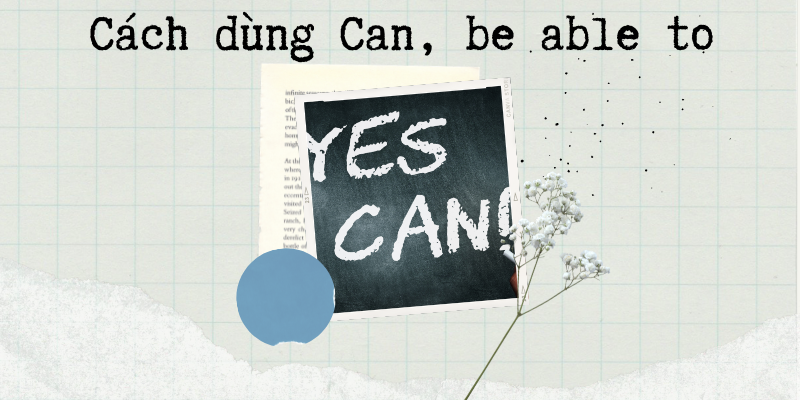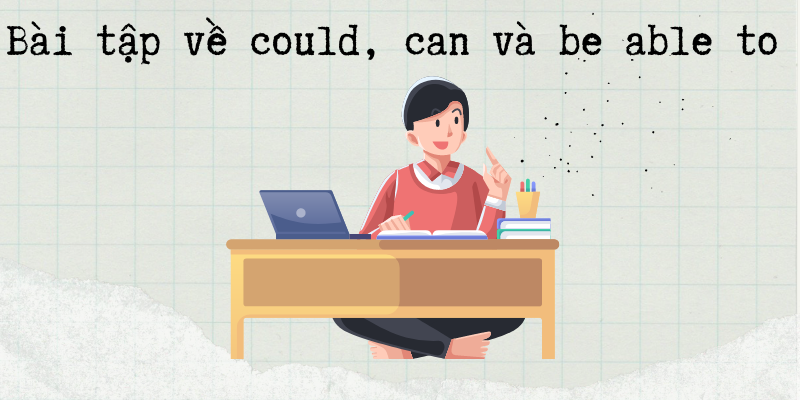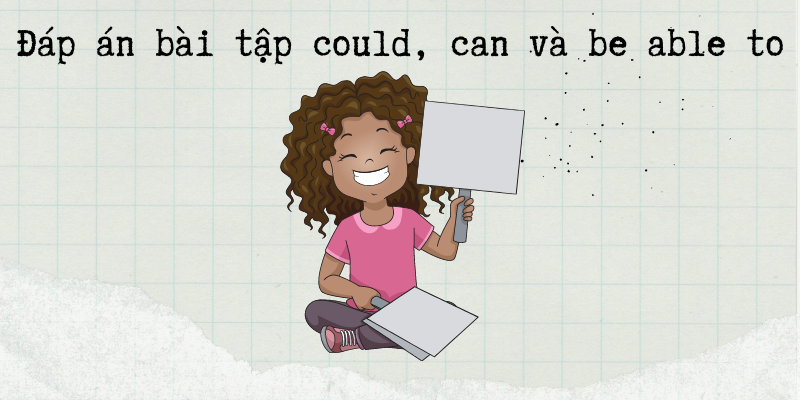Trước khi làm Bài tập Can, Could, be able to trong tiếng Anh, chúng ta hãy cùng học qua lí thuyết qua bài viết dưới đây nhé. Bởi động từ khuyết thiếu Can, Could, be able to là phần ngữ pháp cực kỳ quan trọng khi học tiếng Anh. Hãy cùng nhau theo dõi nhé!
Nội dung chính
1. Cách dùng can và be able to: (ở “hiện tại” hoặc “tương lai”)
1.1. Cách dùng chung
Để chỉ một việc gì đó là khả dĩ
Ví dụ:
You can see the sea from our bedroom window.
Từ cửa sổ phòng ngủ của chúng ta em có thể nhìn thấy biển.
Có khả năng làm một việc gì đó
Ví dụ:
- Can you speak any foreign language?
Bạn có nói được ngoại ngữ nào không?
- I’m afraid I can’t come to your party next Friday.
Tôi e rằng tôi không thể tới dự bữa tiệc của anh vào thứ sáu tới.
“Be able to” có thể thay thế được cho “can”, nhưng “can” thì thường gặp hơn
Ví dụ:
Are you able to speak any foreign languages?
Anh nói được ngoại ngữ nào không?
1.2. Cách dùng riêng
“can” chỉ có hai thể: “can” (hiện tại) và “could” (quá khứ) => Vì vậy đôi khi phải sử dụng “be able to”
Ví dụ:
- I can’t sleep recently => SAI vì “recently” (gần đây) là trạng từ chỉ thời gian của thì hiện tại hoàn thành, mà “can” không có ở thì này.
Sửa ĐÚNG: I haven’t been able to sleep recently. (Gần đây tôi bị mất ngủ.)

- Tom might not be able to come tomorrow.
Ngày mai có thể Tom không đến được => “can” không có thể nguyên mẫu.
” can” dùng để xin phép hoặc cho phép
Ví dụ:
- “Can I go out?”
Em có thể ra ngoài được không ạ? => xin phép
- “You can go.”
Em được phép ra ngoài => cho phép
2. Cách dùng could
“Could” là quá khứ của “can”.
“Could” cũng được dùng trong mệnh đề phụ do chi phối của động từ quá khứ ở mệnh đề chính
Ví dụ:
- He tells me he can play the piano.
(Anh ấy nói với tôi anh ấy có thể chơi được đàn piano) => mệnh đề chính chia thì hiện tại đơn giản “tells” nên mệnh đề phụ dùng “can”.
- He told me he could play the piano.
(Anh ấy đã nói với tôi anh ấy có thể chơi piano) => mệnh đề chính chia thì quá khứ đơn giản “told” nên mệnh đề phụ dùng “could”.
“Could” (nghĩa “có lẽ”) dùng để chỉ một việc có lẽ sẽ diễn ra trong “tương lai” nhưng “chưa chắc chắn”
Ví dụ:
I hear something coming. It could be John.
Tôi nghe thấy tiếng vọng về đây. Có lẽ đó là tiếng của John
=> Người nói chưa chắc chắn, đang nghĩ có lễ âm thanh đó là của John, hình như John sắp xuất hiện trước mắt họ (tương lai).
“could” đặc biệt sử dụng với những động từ sau: See (nhìn), hear (nghe), smell (ngửi), taste (nếm), feel (cảm thấy), remember (nhớ), understand (hiểu)
Ví dụ:
- When we went into the house, we could smell burning.
Khi chúng tôi bước vào nhà, chúng tôi có thể ngửi thấy mùi cháy khét.
- She spoke in a low voice but I could understand what she was saying.
Cô ta nói giọng nhỏ nhưng tôi có thể hiểu được cô ây đang nói cái gì.
“could” để chỉ người nào có khả năng làm việc gì đó
Ví dụ:
When Tom was 16, he could run 100 meters in 11 seconds.
Khi Tom được 16 tuổi, anh ta có thể chạy 100m trong vòng 11 giây.
NHƯNG nếu bạn muốn nói rằng người ta đang tìm cách xoay sở làm một việc gì đó trong một hoàn cảnh “đặc biệt” hoặc “nguy cấp” VÀ việc đó có khả năng xảy ra thì phải sử dụng “was/ were able to” hoặc”managed to” (không phải “could”).
Ví dụ:
- The fire spread through the building very quickly everyone was able to escape.
Ngọn lửa lan khắp toà nhà rất nhanh nhưng mọi người đều tìm cách thoát thân được. (không nói “could escape”)
- They didn’t want to come with us at first but in the end we were able to persuade them.
= They didn’t want to come to us at first but we managed to persuade them.
Thoạt đầu họ không muốn đến với chúng tôi nhưng cuối cùng chúng tôi đã tìm cách thuyết phục được họ. (không dùng “could persuade”).
3. So sánh Can – Could – Be able to
| Use | Example | |
|---|---|---|
| Can | Diễn tả khả năng ở hiện tạiDùng trong câu xin phép, yêu cầu, đề nghị | She can repair her bike herself.Can I go out ? |
| Could | Dùng để diễn tả khả năng ở quá khứDiễn tả một khả năng ở tương laiDiễn tả sự gợi ýDùng trong câu xin phép, yêu cầu, đề nghị với sắc thái trang trọng hơn. | He could learn by heart alphabet when he was four years-old.Our flight could be delayed in 2 hours because of the bad weather.You could phone to him to ask for help.Could I borrow your computer? |
| Be able to | Dùng để diễn tả khả năng, có thay thế cho can/ could | Are you able to speak Spanish? |
4. Bài tập về could, can và be able to
Bài tập
Bài tập 1: Viết các cụm từ trong ngoặc ở dạng đúng vào chỗ trống
- Maybe the Smiths………… a new house next year. (can/ to build)
- If you try hard, you………… your examinations. (can/ to pass)
- When I was five, I…………. (not/ can/ to swim)
- Dennis…………the trumpet after four months. (can/ to play)
- I…………to him on the phone for three weeks last month. (not/ can/ to speak)
- Alex…………his homework when his desk is in such a mess. (not/ can/ to do)
- The car fell in to river. The worker….. get it out but the driver was dead.

- I knew the town so I …. advise him where to go.
- Despite the arrival of the storm, they……. finish the football match.
- After his car crashes he was so confused that he …. tell the police who he was or where he was going.
- I haven’t …. concentrate recently at work. I don’t know what it is.
- Last week we………… swimming, this week we can’t. (can/ to go)
- Maybe the Smiths………… a new house next year. (can/ to build)
- If you try hard, you………… your examinations. (can/ to pass)
- When I was five, I…………. (not/ can/ to swim)
- Dennis…………the trumpet after four months. (can/ to play)
- Luke has passed his driving test, now he………… a car. (can/ to drive)
- I…………to him on the phone for three weeks last month. (not/ can/ to speak)
- Alex…………his homework when his desk is in such a mess. (not/ can/ to do)
- They were so busy, they…………me. (not/ can/ to text)
- Lisa………… her dress. She can wear it again. (can/ to clean)
Bài tập 2: Hoàn thành các câu sử dụng can hoặc (be) có thể. Sử dụng có thể nếu có thể, nếu không, sử dụng (có thể) có thể
- Gary has travelled a lot. He can speak five languages.
- I haven’t been able to sleep very well recently.
- Nicole ………..drive, but she doesn’t have a car.
- I used to ………..stand on my head, but I can’t do it any more.
- I can’t understand Mark. I’ve never ………..understand him.
- I can’t see you on Friday, but I ………..meet you on Saturday morning.
- Ask Katherine about your problem. She might……….. help you.
Bài tập 3: Complete the sentences with can/can’t/could/couldn’t + the following
| believe come hear run sleep wait |
- I’m afraid I can’t come to your party next week.
- When Dan was 16, he …………….100 metres in 11 seconds.
- ‘Are you in a hurry?’ ‘No, I’ve got plenty of time. I ……………..’
- I don’t feel good this morning. I …………….last night.
- Can you speak a little louder? I …………….you very well.
- I was amazed when I heard the news. I …………….it.
Bài tập 4: Complete the answers to the questions with was/were able to
Hội thoại 1
A: Did everybody escape from the fire?
B: Yes. The fire spread quickly, but everybody was able to escape.
Hội thoại 2
A: Did you finish your work this afternoon?
B: Yes, there was nobody to disturb me, so I ……………….
Hội thoại 3
A: Did you solve the problem?
B: Yes, we did. It wasn’t easy, but we ……………….
Hội thoại 4
A: Did the thief get away?
B: Yes. No-one realised what was happening and the thief ……………….
Bài tập 5: Complete the sentences using could, couldn’t or managed to
- My grandfather travelled a lot. He could speak five languages.
- I looked everywhere for the book, but I couldn’t find it.
- They didn’t want to come with us at first, but we managed to persuade them.
- Jessica had hurt her foot and …………….walk very well.
- There was a small fire in the kitchen, but fortunately I …………….put it out.
- The walls were thin and I …………….hear people talking in the next room.
- I ran my first marathon recently. It was very hard, but I …………….finish.
- My grandmother loved music. She …………….play the piano very well.
- We wanted to go to the concert, but we …………….get tickets.
- A girl fell into the river, but some people……………. pull her out. She’s all right now.
Xem thêm: Bài tập về đại từ nhân xưng, tính từ, đại từ sở hữu
Bài tập 6: Now that we’ve refreshed the basics, see if you can complete the following sentences correctly
- ______ you hear the fireworks from your house last night?
a. Can b. Can’t c. Could
- Do you think you ______ write that report by Tuesday? I know you’re very busy.
a. will be able to b. couldn’t c. have been able to
- I ______ touch my toes. See!
a. could b. can c. will be able to
- I ___ spend another moment in that restaurant. It was too noisy.
a. can’t b. couldn’t c. have been able to
- I ___ never seem to get the temperature right.
a. can b. can’t c. to be able to
- __ play professional tennis, you must be extremely fit.
a. Couldn’t b. Will you be able to c. To be able to
- ___ you play an instrument?
a. Able to b. Couldn’t c. Can
- I’m afraid I ___ attend the meeting, I’m on business in Japan.
a. won’t be able to b. will be able to c. can
- ___ you have brought it to me at work?
a. Couldn’t b. Cannot c. Will be able to
- They ___ save the men from the sinking ship.
a. were able to b. was able to c. could to
Bài tập 7: Đọc và hoàn thành cuộc phỏng vấn về robot gia đình có thể hoặc không thể
Interviewer: Robots are already in factories. Will people have robots at home?
Robot expert: Yes, they will. I think they (1)______ do all of our housework.
Interviewer: But they (2)______ replace the personal computer. Is that right?
Robot expert: That’s true, but one day they (3)______ use computers.
Interviewer: Amazing! What other things (4)______ home robots ______ do?
Robot expert: Well, they will be able to do the gardening but they (5)______ play sports and games with you.
Bài tập 8: Sử dụng những từ đã cho và will/ won’t be able to để hoàn thành câu
- Teaching robots/ check your health.
- Computers/ do the laundry.
- Smart phones/ recognize a voice.
- Worker robots/play sports.
- Home robots/ make breakfasts.
- Teaching robots/ give lessons.
Đáp án
Bài tập 1
- will be able to build
- can pass
- could not swim
- could play
- could not speak
- will not be able to do
- was able to
- could
- were able to
- couldn’t

- been able to
- could go
- will be able to build
- can pass
- could not swim
- could play
- can drive
- could not speak
- will not be able to do
- could not text
- has been able to clean
Bài tập 2
| 3. can | 4. be able to | 5. been able to | 6. can | 7. be able to |
Bài tập 3
| 2. could run | 3. can wait | 4. couldn’t sleep | 5. can’t hear | 6. couldn’t believe |
Bài tập 4
| 2. was able to finish it | 3. were able to solve it | 4. was able to get away |
Bài tập 5
| 4. couldn’t | 5. managed to | 6. could | 7. managed to | 8 could | 9. couldn’t | 10. managed to |
Bài tập 6
| 1. c | 2. a | 3. b | 4. b | 5. a | 6. c | 7. c | 8. a | 9. a | 10. a |
Bài tập 7
| 1. will be able to | 2. won’t be able to | 3. will be able to | 4. will (home robots) be able to | 5. won’t be able to |
Bài tập 8
- Teaching robots won’t be able to check your health.
- Computers won’t be able to do the laundry.
- Smart phones will be able to recognize a voice
- Worker robots won’t be able to play sports.
- Home robots will be able to make breakfasts.
- Teachinh robots will be able to give lessons
Bài tập về can could be able to trong tiếng Anh gồm bài tập trắc nghiệm và bài tập tự luận kèm đáp án sẽ giúp các bạn hiểu rõ hơn về cách sử dụng và phân biệt can could be able to với từng văn cảnh cụ thể. Hi vọng những chia sẻ của ieltscaptoc.com.vn sẽ giúp ích cho việc học tập của các bạn. Chúc các bạn học tập tốt!

